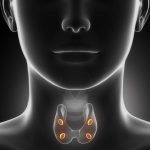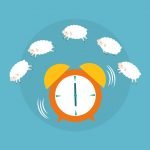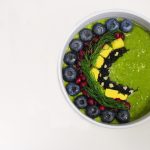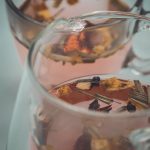Education – Spongetivity: The Importance of Staying Curious
FRASER SMITH, MATD, ND
The other day, I was speaking with colleague named Rich. He appreciates portmanteau words just as much as I do. These are terms such as “frankenfood” or “brunch.” While Rich and I were speaking, he tossed out a new expression that resonated with me as a naturopathic medical teacher. The term was “spongetivity.” What is the meaning of this new word? Spongetivity refers to the ability or capacity to be rapid and open-minded assimilators of information, like children, and sponge-like in soaking up knowledge. After speaking with Rich, I reflected on my own efforts to stay curious and willing to learn.
My thoughts then shifted to naturopathic medical students. Who needs the ability to assimilate and utilize massive amounts of knowledge more than a naturopathic medical student? What better way to learn than with the openness and playful ease of a child? Naturopathic medical students are naturally curious people. They innately collect information and have a lot of insight. Before they even arrive at naturopathic medical college, they have asked themselves questions about why so many people suffer from chronic disease. They have often done their own research on ways to help make the body more resilient. First-year naturopathic medical students tell me that finding naturopathic medicine was a lock and key phenomenon. They already had a vision of how they wanted to help people, but they did not realize a profession existed that already worked with people in that same way.
In naturopathic medical education and in the broader world of medical education, our natural spongetivity can wither under the weight of rigor, routine, and fatigue. The same student who could easily digest a Michael Pollan nutrition book in an afternoon, or watch a video about nutrigenomics and get it, now sweats over understanding and memorizing endless structures, biochemical pathways, doses, diagnoses, and much more. How does this happen? What does the medical literature have to say about it? Is there a way we can engender curiosity and receptivity in our students?
Where Did Our Spongevity Go?
Somewhere during medical training, the natural spongevity of the student can be lost. But why? The most obvious cause is the sheer volume of work that must be completed across a wide range of courses. Another contributor is the rapid cadence and amount of time spent sitting and studying. This kind of pace combined with having little time for anything outside of school can introduce a type of drudgery to learning about the human body, the nature of healing, and disease. Learning this way is different from selecting what to pay attention to based on one’s innate curiosity at any given moment. In medical school, one must review and assimilate long lists of things, some of which may not be particularly interesting. Also, in medical school, the stakes of learning are high. If medical students get behind in weekly readings and lecture notes, it can create a snowball effect that can be difficult to recover from. So, as students, we “buckle down” (or knuckle down if that is your idiom) and make ourselves do the work assigned. We become student professionals, and then one day, we are simply professionals. Fortunately, the attributes of hard work and a high capacity to process information follow us into clinical practice, but that does not mean we have not also lost something of our curiosity along the way.
It’s easy to focus on the need-to-know material in medical school. This is a survival trait and is an adaptive response. “What do I need to know to pass this course?” becomes a brilliant question when facing 27 credits at once. Unfortunately, the powerful learning that happens spontaneously and naturally becomes suppressed, as does the inspiration that accompanies it.
In medical literature, there are numerous reports about burnout and drudgery. The concept that most applies to this discussion is, I think, that of curiosity – a quality so important that the Association of American Medical Colleges (AAMC) and the Howard Hughes Medical Institute (HHMI) spoke to it in Scientific Foundations for Future Physicians.1 This document describes the process of creating competencies for physicians. One of 4 overarching principles is: “Curiosity, skepticism, objectivity, and the use of scientific reasoning are fundamental to the practice of medicine. These attributes should permeate the entire medical education continuum.”1
Curiosity Loss During Medical Training
So, if the overwhelm of information reduces curiosity in early training, why can curiosity continue to decline even after that training is complete? In the American Journal of Medicine article by Adashi, Ahmed, and Gruppuso titled, “The Importance of Being Curious,” the authors bring up the ways in which residents lose curiosity.2 Stifling clinical loads, compounded by physician burnout, all too often snuff out all attempts at exercising curiosity, no matter how hard one might strive to resist. 2 The rise of algorithmic, guideline-driven medicine also takes its toll on the innately curious mind.
Additionally, the point and click tedium of electronic medical records leaves little room for imagination. Examined in hindsight, trading independent thinking for the promise of digital efficiency and consistency may be the death of mindful awareness. Stated differently, trading curiosity for formulaic convenience may turn “physicians” into “providers.” Sir William Osler summarized it all by cautioning that “the greatest enemy to the scientific practice of medicine is the practice of the routine.”2
Can Curiosity be Reignited?
Medical students should not be a consumer or aggregator of facts. As a student, one should be a thinker, a hypothesis maker, and a tester. There are many ways to approach the challenge of reigniting curiosity. One method used when I was a medical student was problem-based learning. McMaster University in Ontario pioneered this teaching technique, which was replicated in many other venues, including Harvard Medical School and McGill University. Problem-based learning is designed to:3,4
- Give students situations that require them to posit questions
- Provide opportunities for the student to attempt to answer those questions
- Require mentorship from the professor to make the most of the process
The mentorship is the kernel in the software program of problem-based learning. I had a little taste of it as a student with the amazing teacher Dr David Chandross.
Dr Chandross has been, for some time, doing groundbreaking work in gamification in the classroom. He uses gaming principles to create learning experiences. Learning games reduces monotony. Games tap into the innate human drive to explore, question, solve problems, and obtain knowledge to use towards achieving a goal. The neurobiology of this process is fascinating. Learning informed by advances in neurobiology is one of the new developments in education. It is not surprising that those who have the most plastic brains and excel at spongetivity are children. No one seems to pick up games faster than children. For example, Minecraft, Roblox, Fortnite, and dozens of other games kids can play to expert levels. When they are playing, they acquire a lot of information about the rules and tactics of gameplay, along with many details about the game’s world. Guidebooks exist for these games, as do tutorials online, but spend some time with a kid learning to play a new game and it is clear how rapidly they can acquire and apply a great deal of information simply by following their own curiosity and instincts.
Why can’t we tap into that genius when we are medical students? There is a countervailing sentiment in medical education that there is a certain amount of hard work involved in becoming a doctor. To be the best physician requires a lot of hard work – a supreme effort. It is OK if it’s not a laugh a minute. That is just part and parcel of medical school. Being a doctor is not a game, you have someone’s life in your hands. In a 2004 article published in the British Medical Journal, Williams and Lau said of problem-based learning:5
This strategy is entirely untested in UK medical students, and no evidence exists that it will produce better doctors. And, the absence of evidence that new ideologies will produce better doctors than traditional curriculums forces us to conclude that these reforms are being propelled more by evangelical zeal than by rationale. Despite their faults, traditional curriculums have managed to produce humane and conscientious doctors with a solid knowledge base that equips them for a career in a broad spectrum of medicine. By contrast, there has been no test in the UK of the ability of the now fashionable “minimalist” approach to training doctors who are adaptable and skilled enough to work in all specialties. By pushing these changes through with undue haste, the reformers have effectively thrown out the bathwater, baby, and much of the plumbing.4
I can understand where they are coming from. Even though there is some point of lecture fatigue, overall, students do well with a well-organized presentation of material. However, there are advantages to having a mixture of learning approaches. I think this keeps the brain out of autopilot mode and helps us pay attention. A switch between a case, a lecture, and a group discussion can keep things interesting. Even Williams and Lau admitted that diversity in approaches to medical training is welcome.4
Fostering Curiosity During Training and Beyond
The Dean of Harvard Medical School, in his message to the class of 2015, cited curiosity as key to deepening self-awareness and to building respectful relationships with patients. He also cited a similar array of challenges as Adashi, Ahmed, and Gruppuso, including the 15-minute clinical visit.5
We should not forget that medical school seeks to forge both the mentally efficient and thoughtful entry-level doctor, but that these qualities can come as tradeoffs. If students develop too narrow of a focus during their studies, it is not just what they may miss in terms of seeing and hearing the patient, it’s losing the ability to learn quickly, adapt to new information, and remain cognizant enough to continue to ask questions like: “Why is this happening, what else could be going on here, and what else could help this person?”
It seems that we, as naturopathic physicians, have it better. While we strive to build treatment plans informed by best evidence, we are not constrained by narrow algorithms with every patient interaction. Perhaps a B12 deficiency is always headed for a B12 injection or a sublingual drop, but with most of our chronic and complex cases, we must apply the naturopathic principles in action, every day, and with each new patient. In my experience, curiosity in naturopathic medical students is alive and well. As educators, we have an obligation to support it. “Spongetivity” is a resource and a synergist. As I have shared in a past column, I will never forget an elderly Dr John Bastyr visiting CCNM when I was a new student. He told us how he still read a couple of articles from journals like The Lancet every evening. Maybe the most excellent physicians have the highest curiosity. It is certainly something to strive towards.
References
- Alpern R. Scientific Foundations for Future Physicians. Association of American Medical Colleges. Available at: https://store.aamc.org/scientific-foundations-for-future-physicians-pdf.html. Published 2009. Accessed February 21, 2022.
- Adashi EY, Ahmed AH, Gruppuso PA. The Importance of Being Curious. Am J Med. 2019;132(6):673-674.
- Smith F, Chandross D. Rethinking Curriculum Toward an Integrated Program in Naturopathic Medical Education. Naturopathic Doctor News & Review. Available at: https://ndnr.com/education-web-articles/rethinking-curriculum-toward-an-integrated-program-in-naturopathic-medical-education/. Published November 6, 2017. Accessed February 21, 2022.
- Williams G, Lau A. Reform of undergraduate medical teaching in the United Kingdom: a triumph of evangelism over common sense. BMJ. 2004;329(7457):92-94.
- Flier J. Dean’s Corner: Exercise Your Curiosity. Harvard Medical School. Available at: https://hms.harvard.edu/news/deans-corner-exercise-your-curiosity#:~:text=Some%20scholars%20have%20researched%20the,to%20understanding%20each%20patient’s%20illness.&text=It%20is%20also%20key%20to,building%20respectful%20relationships%20with%20patients. Published May 28, 2015. Accessed February 22, 2022.

Fraser Smith, MATD, ND is Assistant Dean of Naturopathic Medicine and Professor at the National University of Health Sciences (NUHS) in Lombard, IL. Prior to working at NUHS, he served as Dean of Naturopathic Medicine at the Canadian College of Naturopathic Medicine (CCNM) in Toronto, Ontario. Dr. Smith is a licensed naturopathic physician and graduate of CCNM.










